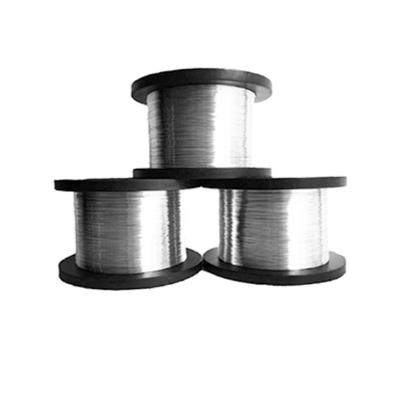Tin plated nickel wire, also known as tin coated nickel wire, is widely used for conductor or connecting wire for electronic components. In this article , we will walk through the property of these wires.
Nickel is a harder metal than other common coatings and has excellent high temperature resistance. The operating temperature range of nickel plating depends on the thickness of the coating. Nickel is very resistant to harsh environments and corrosion. However, due to its hardness, nickel may need to activate the flux to complete the soldering. Crimping termination can be a good choice for nickel-plated wire, but pay attention to the adjustment of the mold. The conductivity of nickel is relatively low, and electroplating increases the resistance of the wire.
Tin is the most common coating material. Tin plating provides strong electrical conductivity, corrosion resistance, and improves the solderability of base metals, otherwise they cannot be effectively soldered. Tin can effectively prevent oxidation at temperatures as high as 150°C. Although it is also a relatively poor conductor, nickel provides effective oxidation resistance up to about 450°C.
Tin Plated Nickel Wire Advantages
Electrical conductivity: Tin coated nickel wire offers excellent electrical conductivity due to the conductive properties of both nickel and tin. If your application requires efficient electrical transmission or high conductivity, this type of wire can be a suitable choice.Corrosion resistance: Nickel is highly resistant to corrosion, and the tin coating provides an additional layer of protection against oxidation. If your application involves exposure to moisture, chemicals, or other corrosive environments, tin coated nickel wire can help prevent rusting and maintain its performance over time.
Solderability: The tin coating on nickel wire enables easy soldering connections due to the tin's low melting point and good wetting properties. If your application requires soldering or if you need wire that can be easily joined with other components, tin coated nickel wire is a favorable option.
Flexibility and ductility: Tin coated nickel wire retains the flexibility and ductility of both nickel and tin. It can be easily formed, bent, or shaped without breaking, allowing for greater design flexibility in various applications.
Thermal stability: Nickel has good thermal stability and can withstand high temperatures without significant degradation. The tin coating enhances the wire's resistance to heat, making it suitable for applications involving elevated temperatures.
Low contact resistance: The tin coating on the nickel wire helps reduce contact resistance, ensuring good electrical connections when the wire comes into contact with other conductive elements. This can be beneficial in applications where low resistance and reliable electrical connections are critical.
Tin Plated Nickel Wire Applicaitons
Electrical and Electronics Industry: Tin coated nickel wire is widely used in the electrical and electronics industry for its excellent conductivity and corrosion resistance. It is commonly used in the manufacturing of resistors, capacitors, thermocouples, and electrical heating elements.Automotive Industry: In automotive applications, Tin coated nickel wire
is utilized for wiring harnesses, sensors, and connectors. Its corrosion resistance and electrical conductivity make it suitable for demanding automotive environments.
Telecommunications Industry: Tin coated nickel wire wire is employed in telecommunications equipment, including antennas and coaxial cables. Its conductivity and durability ensure efficient signal transmission and resistance to environmental factors.
Medical Devices: The medical industry utilizes tin coated nickel wire in various applications, such as pacemakers, defibrillators, and medical probes. Its biocompatibility and corrosion resistance are critical factors for medical device performance.
Jewelry and Craftsmanship: Tin coated nickel wire is popular among jewelry makers and craftsmen due to its attractive appearance, malleability, and tarnish resistance. It is used for wire wrapping, beading, and decorative purposes.
Chemical Industry: Tin coated nickel wire finds applications in the chemical industry, particularly in electroplating processes. It can be used as an electrode or a substrate for various plating applications due to its corrosion resistance and electrical properties.
Aerospace and Defense: Tin coated nickel wire is utilized in aerospace and defense applications for its high strength, resistance to extreme temperatures, and corrosion resistance. It is commonly used in wiring, connectors, and other critical components.
These are just a few examples of the diverse applications of tin coated nickel wire. Its unique combination of properties makes it a versatile material that spans multiple industries. After understanding the combined properties of tin coated nickel wire, carefully consider these factors as well as the specific requirements of your application when deciding on tin coated nickel wire.
Learn more about our products: https://www.hldxsensor.com/product/tin-plated-nickel-wire.html







